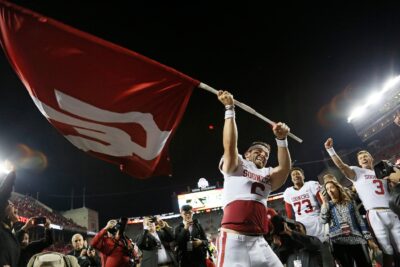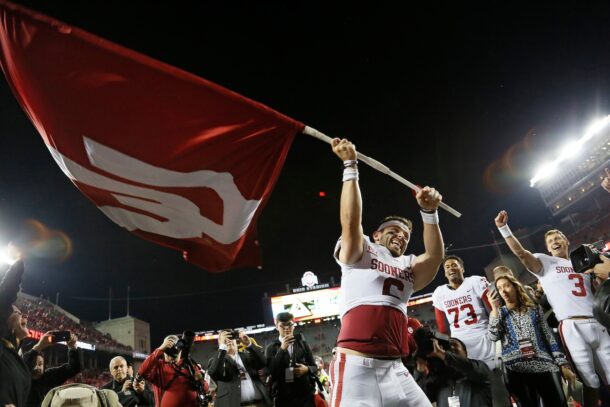By now, the saga of Todd Gurley’s suspension for accepting cash in exchange for autographing memorabilia has been played out through the NCAA, but details continue to emerge from the situation. Sports Illustrated’s Andy Staples and ESPN’s Brett McMurphy secured a joint interview with the man that put the very public case out into the mainstream.
Gurley served a four-game suspension for accepting more than $3,000 in exchange for autographs, $400 of which came from Bryan Allen, the man who fed the story to the media, and a partner named Shane Smith.
The stories go into Allen’s background and his current situation, which finds him “couch-surfing” between friends’ homes and out of a job. “I do take responsibility,” Allen said in the SI story. “But my intentions were never to try to get rich. I think people think I’m this autograph broker that was dangling this carrot in front of these young college kids. That couldn’t be further from it. I’m not an autograph broker.”
In total, Gurley signed about 80 items for Allen and Smith. Allen says he sold three of them for a total of $150, giving others away. Additionally, Smith told Georgia officials he paid Gurley “thousands of dollars since his freshman year,” a claim that ESPN’s McMurphy verified through a source.
Allen has had a rough go since the story came out, having his identity and personal information posted online, getting fired from his job and getting kicked out of the house he was renting. You can check out the ESPN and SI stories for the full details.
Here are some of the highlights from Allen’s story.
How Allen came in contact with Gurley (from SI):
According to Allen, Smith said he had a signing set up with Gurley, who was about to enter his junior season…Allen says Smith told him Gurley wanted $400 for the signing. Allen says Smith asked Allen to put up more than half — Allen doesn’t remember if it was $225 or $250. “I never brokered any deal. That’s the huge part I want out there,” Allen says. “I never called a player. I never tried to set a signing up. Nothing. This guy came to me and asked me, ‘Will you help me with this?’ You can’t just put the blame on one person because everybody’s equally to blame. All I had to do was tell him ‘No’ and none of this happens.”
The signing itself (from SI):
Allen says Smith met with Gurley and brought him to Allen’s car. Gurley sat in the passenger seat. Smith sat in the driver’s seat. Allen sat in the back seat so he could hand items to Smith, who would then hand them to Gurley to autograph. After signing, Gurley passed the items to Smith, who passed them back to Allen to place in bags. Allen says he noticed Smith taking cellphone photographs of Gurley, presumably to later show to an authentication service to verify that the signatures weren’t fakes.
When Allen noticed Smith taking pictures of the interior of the car, he says he got nervous and pulled out his own phone to shoot a video. Later, when Allen showed the video to various media outlets, he would be asked why it didn’t show Gurley’s face. Allen says now that was because he wanted to make sure he captured Smith’s face — not Gurley’s.
Allen estimates the signing took between 10 and 20 minutes. Allen says Smith told him to place the money on the dashboard instead of handing it directly to Gurley. Allen says Gurley took the cash and counted it out to ensure the correct amount. “He was like, ‘Y’all be good.’ And he got out of the car and he walked away,” Allen says. “And that was it. And that was the first and only interaction with Todd Gurley that I’ve ever had.”
Contacted by authorities (from ESPN):
In mid-September, six months after the signing, Allen said he received a call from a blocked number. The individual didn’t identify himself and asked Allen if he had done an autograph signing with Gurley. Allen said he lied and denied it.
Two days later Allen said he received a call from a California area code. The person told Allen he had information of Allen’s involvement with Gurley. This time, Allen said he told the truth.
Leaking the story (from ESPN):
Allen told a friend — not Shane Smith — about the two phone calls and his friend suggested to “nip it in the bud and get your story out before someone tries to leak something and screw you over.”
Allen said he emailed at least two media members with ties to the University of Florida. The subject line in Allen’s email: “I have a story I want you to leak”
Allen also emailed Spencer Hall, a reporter at SB Nation, and another reporter who he thought covered Florida. That email was later forwarded to other media members. Allen said he eventually contacted the website Deadspin.
On Oct. 3, a day after emailing Deadspin, Allen said he left voice mails on the work phones of three members of Georgia’s compliance office. A day later, a Georgia compliance officer called back. Allen said he gave them all the details.
A former freelance journalist from Philadelphia, Brett has made the trek down to SEC country to cover the greatest conference in college football.







